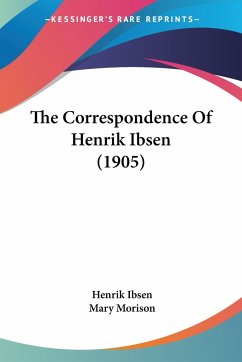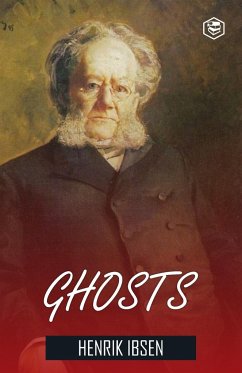
The Pillars Of Society And Other Plays (1888)
Versandkostenfrei!
Versandfertig in 1-2 Wochen
32,99 €
inkl. MwSt.

PAYBACK Punkte
16 °P sammeln!
The Pillars of Society and Other Plays is a collection of four plays written by the renowned Norwegian playwright, Henrik Ibsen. The book was first published in 1888 and contains the plays, The Pillars of Society, A Doll's House, Ghosts, and An Enemy of the People. The Pillars of Society is a play that explores the theme of social responsibility and the role of the individual in society. The story follows a businessman named Karsten Bernick who is forced to confront his past when a dark secret is revealed. A Doll's House is one of Ibsen's most famous plays and is often regarded as a feminist m...
The Pillars of Society and Other Plays is a collection of four plays written by the renowned Norwegian playwright, Henrik Ibsen. The book was first published in 1888 and contains the plays, The Pillars of Society, A Doll's House, Ghosts, and An Enemy of the People. The Pillars of Society is a play that explores the theme of social responsibility and the role of the individual in society. The story follows a businessman named Karsten Bernick who is forced to confront his past when a dark secret is revealed. A Doll's House is one of Ibsen's most famous plays and is often regarded as a feminist masterpiece. The play tells the story of a woman named Nora who is trapped in a marriage and struggles to find her own identity. Ghosts is a play that deals with taboo topics such as incest and venereal disease. The story follows a widow named Mrs. Alving who is haunted by the sins of her late husband. An Enemy of the People is a play that explores the conflict between the individual and society. The story follows a doctor named Thomas Stockmann who discovers that the town's baths are contaminated and fights against the corrupt officials who try to cover up the truth. Overall, The Pillars of Society and Other Plays is a collection of thought-provoking and powerful plays that continue to be relevant today.This scarce antiquarian book is a facsimile reprint of the old original and may contain some imperfections such as library marks and notations. Because we believe this work is culturally important, we have made it available as part of our commitment for protecting, preserving, and promoting the world's literature in affordable, high quality, modern editions, that are true to their original work.













